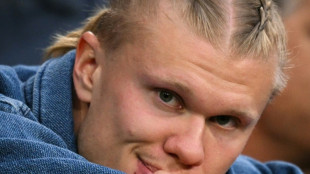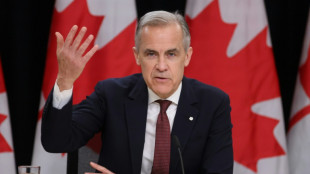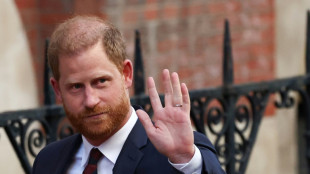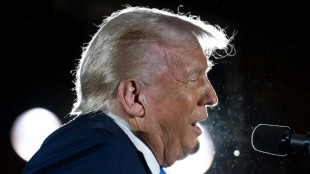
-
 Lives on hold in India's border villages with Pakistan
Lives on hold in India's border villages with Pakistan
-
Musk's dreams for Starbase city in Texas hang on vote

-
 Rockets down Warriors to stay alive in NBA playoffs
Rockets down Warriors to stay alive in NBA playoffs
-
Garcia beaten by Romero in return from doping ban

-
 Inflation, hotel prices curtail Japanese 'Golden Week' travels
Inflation, hotel prices curtail Japanese 'Golden Week' travels
-
Trump's next 100 days: Now comes the hard part

-
 Mexican mega-port confronts Trump's tariff storm
Mexican mega-port confronts Trump's tariff storm
-
Trump's tariffs bite at quiet US ports

-
 Ryu stretches lead at LPGA Black Desert Championship
Ryu stretches lead at LPGA Black Desert Championship
-
Singapore votes with new PM seeking strong mandate amid tariff turmoil

-
 Five things to know about the Australian election
Five things to know about the Australian election
-
Scheffler fires 63 despite long delay to lead CJ Cup Byron Nelson

-
 Israel launches new Syria strikes amid Druze tensions
Israel launches new Syria strikes amid Druze tensions
-
Finke grabs 400m medley victory over world record-holder Marchand

-
 Apple eases App Store rules under court pressure
Apple eases App Store rules under court pressure
-
Polls open in Australian vote swayed by inflation, Trump

-
 Russell clocks second fastest 100m hurdles in history at Miami meeting
Russell clocks second fastest 100m hurdles in history at Miami meeting
-
Germany move against far-right AfD sets off US quarrel

-
 Billionaire-owned Paris FC win promotion and prepare to take on PSG
Billionaire-owned Paris FC win promotion and prepare to take on PSG
-
Teenager Antonelli grabs pole for Miami sprint race

-
 Man City climb to third as De Bruyne sinks Wolves
Man City climb to third as De Bruyne sinks Wolves
-
Mercedes' Wolff backs Hamilton to come good with Ferrari

-
 'Devastated' Prince Harry says no UK return but seeks reconciliation
'Devastated' Prince Harry says no UK return but seeks reconciliation
-
Elway agent death likely accidental: report

-
 Turkish Cypriots protest new rule allowing hijab in school
Turkish Cypriots protest new rule allowing hijab in school
-
Germany's AfD dealt blow with right-wing extremist label

-
 Trump NASA budget prioritizes Moon, Mars missions over research
Trump NASA budget prioritizes Moon, Mars missions over research
-
Hard-right romps through UK polls slapping aside main parties

-
 Rangers hire two-time NHL champion Sullivan as coach
Rangers hire two-time NHL champion Sullivan as coach
-
Haaland on bench for Man City as striker returns ahead of schedule

-
 US designates two Haitian gangs as terror groups
US designates two Haitian gangs as terror groups
-
Lower profits at US oil giants amid fall in crude prices

-
 NBA icon Popovich stepping down as Spurs coach after 29 seasons
NBA icon Popovich stepping down as Spurs coach after 29 seasons
-
'Devastated' Prince Harry says no return to UK but seeks royal reconciliation

-
 Grande scratched from Kentucky Derby
Grande scratched from Kentucky Derby
-
Carney vows to transform Canada economy to withstand Trump

-
 Prince Harry says he would 'love' to reconcile with family
Prince Harry says he would 'love' to reconcile with family
-
Major offshore quake causes tsunami scare in Chile, Argentina

-
 GM cuts shift at Canada plant over 'evolving trade environment'
GM cuts shift at Canada plant over 'evolving trade environment'
-
F1 extends deal to keep Miami GP until 2041

-
 Popovich mixed toughness and spirit to make NBA history
Popovich mixed toughness and spirit to make NBA history
-
US asks judge to break up Google's ad tech business

-
 Trump eyes huge 'woke' cuts in budget blueprint
Trump eyes huge 'woke' cuts in budget blueprint
-
Ruud downs Cerundolo to book spot in Madrid Open final

-
 Gregg Popovich stepping down as San Antonio Spurs coach after 29 seasons: team
Gregg Popovich stepping down as San Antonio Spurs coach after 29 seasons: team
-
Guardiola to take break from football when he leaves Man City

-
 Vine escapes to Tour of Romandie 3rd stage win as Baudin keeps lead
Vine escapes to Tour of Romandie 3rd stage win as Baudin keeps lead
-
Olympic 100m medalist Kerley arrested, out of Miami Grand Slam meet

-
 Chile, Argentina order evacuations over post-quake tsunami threat
Chile, Argentina order evacuations over post-quake tsunami threat
-
Arteta 'pain' as Arsenal fall short in Premier League title race


Why crypto creators want to stay anonymous
The two lifelong friends from Florida never sought the limelight, but then they built a multi-million-dollar empire selling digital art and people wanted to know who they were.
Under the pseudonyms "Gargamel" and "Gordon Goner", they created the "Bored Ape Yacht Club", a collection of 10,000 cartoons of apes with various hairstyles and outfits.
They sell these images as digital tokens (NFTs), and it is now hard to get one for less than $280,000, thanks partly to celebrity endorsements from the likes of Paris Hilton to Serena Williams.
US news outlet BuzzFeed did some sleuthing earlier this month and uncovered their true identities -- sparking an outpouring of anger among fans on social media.
"Doxing is wack, putting people at risk," wrote one Twitter user, employing internet slang for identifying someone against their will.
The story has refocused attention on anonymity in the world of cryptocurrencies.
While the creators of the "Bored Apes" may like to hide in the crypto world, they are owners of a business called Yuga Labs, so they have to follow all the usual rules of company filings, including providing named beneficiaries.
"Using a pseudonym does not make you anonymous," says Alexander Stachtenko, a cryptocurrency expert for the firm KPMG.
- Risk of robbery -
It is unclear why the Bored Apes founders wanted to stay anonymous -- they had given several interviews under their pseudonyms.
Critics say anyone making money from NFTs would be wise to seek anonymity as what they are selling is worthless.
Fans though revel in being part of a community where NFT ownership is often a gateway to games and other perks.
Either way, anyone making serious wealth in this field has obvious reasons to stay under the radar.
"I don't need the public in crypto to know who I am, what I look like, my origins," says a creator who goes by the name "Owl of Moistness".
"I don't want to run the risk of having people rob me, or harm my family."
He co-founded Yield Guild Games, a startup focused on NFT video games in the Philippines, where the NFT craze has taken hold across the population.
He points out that the technology that underpins cryptocurrencies and NFTs -- the blockchain -- is a ledger where anyone can trace transactions.
So linking his crypto and real-world identities would allow anyone to find out his wealth.
But the bigger a project gets, the more complicated it is to remain unknown.
"It becomes more difficult if you're going to expand your team," says Soona Amhaz of Volt Capital, a cryptocurrency-focused fund.
- 'The fairest way' -
One of the favoured ways of remaining anonymous in the crypto world is to form a DAO (decentralised autonomous organisation).
DAOs allow people to collaborate and act as a company might, essentially acting like shareholders, but without formal legal standing or named owners.
Anyone extracting profit would still need to pay tax, but linking real-world individuals to these entities is a much trickier task than, say, searching public records to reveal the Bored Apes founders.
This model has served anonymous entrepreneurs well, from "Zeus", the creator of the Olympus cryptocurrency, to "Code Monkey" who set up the Port Finance cryptocurrency.
However, plenty of people use the expectation of anonymity for nefarious purposes.
DAOs and other decentralised entities are particularly vulnerable to fraud, according to analysis firm Chainalysis.
AnubisDAO was one such entity, created by pseudonymous programmers last October with little more than a Twitter account and a logo.
It vanished less than a day after it launched, taking almost $60 million of investors' money, according to Chainalysis.
And it seems the tide is turning against anonymity in the crypto world.
Most of the larger cryptocurrency exchanges now require identity checks to combat this kind of fraud.
But Soona Amhaz believes there are still positives to the DAO idea, arguing that they are policed by the blockchain.
Anyone can trace the transactions of a particular DAO and find out if they are legitimate or suspicious.
There is also another major advantage, she says.
"If you are pseudonymous, it does't matter if you didn’t go to the right school," she says.
"It's just your work that’s being evaluated and your reputation. And that truly is one of the fairest ways to evaluate someone."
Ch.Havering--AMWN